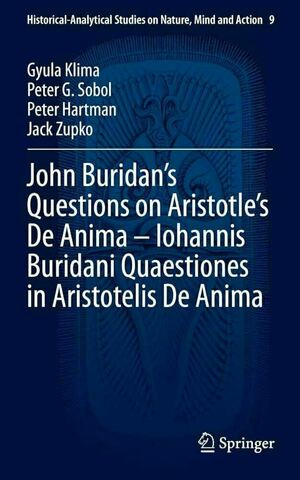John Buridan’s Questions on Aristotle’s De anima—Iohannis Buridani Quaestiones in Aristotelis De Anima.
Notre Dame Philosophical Reviews.
John Buridan’s Questions on Aristotle’s De anima—Iohannis Buridani Quaestiones in Aristotelis De Anima:
Reviewed by Jordan Lavender, Texas A&M University
John Buridan, John Buridan’s Questions on Aristotle’s De anima—Iohannis Buridani Quaestiones in Aristotelis De anima, Gyula Klima, Peter G. Sobol, Peter Hartman, and Jack Zupko (eds.), Springer, 2023, 998pp., $139.99 (hbk), ISBN 9783030944322.
To read this excellent edition and translation of John Buridan’s Questions on Aristotle’s De Anima is to encounter two things at once: an intellectual landscape remote from both ancient hylomorphism and post-medieval European philosophy and a bridge between the two.[1] Like Aristotle, Buridan thinks that all living things are animated by souls. But these souls are in many ways unlike the souls of Aristotle’s De anima. According to Buridan, the souls of non-human animals are themselves a kind of homogeneous substance, composed of extended parts spread throughout the matter of a living thing (QDA 91, 195–197). The arrangement of the integral parts of a living thing and the sensible properties of those parts depend on the soul as their efficient cause, but not as their formal cause (QDA 91–93, 113–115). The core of Aristotle’s account of sense perception—the reception of the form of an object in a sensory organ without the matter—in Buridan becomes a mere efficient causal antecedent to perception itself (more on this below). The operations of the intellect demand no more metaphysical apparatus for their explanation than the perceptual abilities of advanced non-human animals (QDA III, qq. 4–6). Nonetheless, faith requires holding a view of the human soul according to which the ability of such a soul to host sensations and inform a body is miraculous (QDA 257). The editors have made this intellectual landscape available to a wide audience through an excellent edition of the Latin text from the medieval manuscripts; a lucid, philosophically and philologically well-informed translation; expert clarificatory footnotes; and a brief but substantive introduction.
John Buridan (c. 1300–c. 1361) spent his career at the University of Paris as a member of the Faculty of Arts. As the editors indicate, QDA is the product of Buridan’s lectures on the three books of Aristotle’s De anima. It was completed by Buridan sometime after 1347, and probably before 1361 (QDA xiv–xv). However, QDA is not a mere exposition of Aristotle’s De anima or even a textbook summarizing late-medieval psychology. Rather, it is a “question commentary” containing Buridan’s own, often very original, responses to some of the most difficult questions regarding biological life, perception, and thought faced by the philosophy and science of the time. The questions, 51 in all, are loosely arranged according to the order of topics in Aristotle’s De anima. Occasionally, the questions raise issues about how to interpret Aristotle’s works. More often, they focus on philosophical problems. Book 1 (6 questions) covers a wide range of topics and includes a question on the status of universals (q. 5) and an intriguing discussion of the relationship between cognizing properties and cognizing the substances of which they are properties (q. 6). Book 2 (25 questions) begins with a discussion of the soul’s relationship to its powers and to the body (qq. 1–7). After that, almost all of the remaining questions deal with sense perception and include detailed discussions of each of the external and internal senses. (The exception is q. 7, which is the only question in QDA solely devoted to “vegetative” powers and activities.) Book 3 (20 questions) begins with a discussion of the metaphysics of the human intellectual soul (qq. 1–7) and ends with questions devoted to further issues involving the same topic (qq. 17–20). The questions in between (qq. 8–16) contain an extensive discussion of the nature and causes of thought and various related problems.
…
https://ndpr.nd.edu/reviews/john-buridans-questions-on-aristotles-de-animaiohannis-buridani-quaestiones-in-aristotelis-de-anima/



